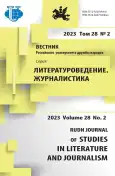The evolution of Arabic historical literature and its current trends: canons and invariants
- Authors: Zarytovskaya V.N.1, Al-Rahbi A.M.1
-
Affiliations:
- RUDN University
- Issue: Vol 28, No 2 (2023)
- Pages: 256-270
- Section: LITERARY CRITICISM
- URL: https://journal-vniispk.ru/2312-9220/article/view/318902
- DOI: https://doi.org/10.22363/2312-9220-2023-28-2-256-270
- EDN: https://elibrary.ru/PNMZSE
- ID: 318902
Cite item
Abstract
The study is devoted to the peculiarities of the development of the Arabic historical novel, the consistent transformation and “erosion” of its canons within the framework of the literary trends of the 20th and 21st centuries. The relevance of the topic, on the one hand, is due to the fact that the historical novel has not lost its significance in Arabic national literature. The share of works of this genre is still high, they occupy the first lines in the distribution of literary prizes. On the other hand, against the background of the general process of globalization, it is interesting to trace the trajectory of the development of the genre in the so-called “lagging” literature, to which many researchers rank Arabic literature. Some works of the genre fell into the focus of both Arabic, Western, as well as domestic orientalist-literary critics and were subjected to deep comprehensive consideration. Today, however, the novels of recent decades also require analysis. The purpose of the study was not just to identify the works of Arab authors that have received wide recognition in recent years, but to fit them into the paradigm of the development of the historical genre and thereby determine its direction in the near future. To do this, the authors tried to compare classical historical novels with modern ones, characterizing their heroes, describing the periods in the history of the Arab world that Arab authors addressed and continue to address within the genre, determining the degree of epic, historical authenticity, etc., in modern examples of the genre. It was found out, that classical heroes with a standard set of heroic qualities that influence the course of history are replaced by thinkers, scientists, dervishes, ordinary observers, and critical epochs and specific historical events are replaced by troubles periods - before or after a catastrophe, major transformations. Conclusions were drawn about the historicity of Arabic literature back in the pre-Islamic era, the long-term preservation of the canons of the Early Middle Ages in the genre, the sharp transformation of the genre and the refusal from the canons under the influence of postmodernism that penetration into Arabic soil in the mid 1960s coincided with the military and social upheavals of the history of Arabs. The direction of the genre, which is pronounced today towards ethnoliterature, is emphasized.
Keywords
About the authors
Victoria N. Zarytovskaya
RUDN University
Author for correspondence.
Email: widaad@yandex.ru
ORCID iD: 0000-0001-9910-7913
Candidate of Pedagogical Sciences, Associate Professor, Associate Professor of the Department of Foreign Languages, Faculty of Humanities and Social Sciences
6 Miklukho-Maklaya St, Moscow, 117198, Russian FederationAhmed M. Al-Rahbi
RUDN University
Email: al-rakhbi-a@rudn.ru
ORCID iD: 0000-0003-4010-1634
Candidate of Philological Sciences, Associate Professor, senior lecturer, Department of Foreign Languages, Faculty of Humanities and Social Sciences
6 Miklukho-Maklaya St, Moscow, 117198, Russian FederationReferences
- Abu Baker, A. (2015). The problematics of identity and identity erasure in Youssef Zeidan‘s Azazeel. Retrieved December 13, 2022, from https://www.researchgate.net/publication/350561069_Alternative_Histories_in_Youssef_Ziedan's_Azazeel_Historiographic_Metafiction_in_the_Contemporary_Arabic_Historical_Novel
- Al-Gibali, M. (2015). History of another life. Asia and Africa Today, (2), 71-72. (In Russ.)
- Alharthi, J. (2018). Celestial bodies. Ross-shire: Sandstone Press.
- Allen, R. (2001). Literary history and the Arabic novel. World Literature Today, 75(2), 205-213. https://doi.org/10.2307/40156519
- Arsly, E.G. (1967). Jirji Zeidan and the Arabic historical novel. Moscow: Nauka Publ. (In Russ.)
- Ayyoub, H. (2021). Alternative histories in Youssef Ziedan's Azazeel: Historiographic metafiction in the contemporary Arabic historical novel. Journal of the Faculty of Philology, Cairo University. (In Arab.) https://10.21608/jarts.2021.68428.1119
- Dayf, Sh. (1960). Era of Jahiliyya. Cairo: Al-Maarif. (In Arab.)
- Harb, L. (2020). Arabic literary theory. Oxford Research Encyclopedia of Literature. https://doi.org/10.1093/acrefore/9780190201098.013.989
- Kirpichenko, V.N. (2003). New and modern literature of Egypt (19-20th centuries). Moscow: Institute of Oriental Studies of the Russian Academy of Sciences. (In Russ.)
- Kopylov, A.N. (2011). Origins and specifics of the genre of the historical novel. Contemporary Humanitarian Studies, (2), 71-76. (In Russ.)
- Orlov, S.A. (1960). Historical novel by Walter Scott. Gorky: Gorky State University. (In Russ.)
- Rastegar, K. (2019). Jurji Zaydan: Avatar of the modern revitalization and worlding of Arabic literature. Wiley Online Library. https://doi.org/10.1002/9781118635193.ctwl0175
- Rayhanova, B. (2004). The past and present in the modern Arabic novel. Zeitschrift der Deutschen Morgenländischen Gesellschaft, (1), 71-84.
- Said, E. (2006) Orientalism. Western concepts of the East. St. Petersburg: Russkii Mir Publ. (In Russ.)
- Sayd, A. (2017). The historical imagination of Abdullah Ibrahim. Journal of Prince Abdul Qadir University of Islamic Sciences. (In Arab.) https://doi.org/10.37138/emirj.v31i1.1673
- Sonallah, I (2001). The committee. Syracuse, New-York: Syracuse University Press.
- Vlasova, Yu.E. (2021). Customs and traditions of the Sultanate of Oman and their reflection in Jokha al-Harti's novel “Celestial Bodies”. Philology: Scientific Research, (11), 27-37. (In Russ.)
- Zarytovskaya, V.N. (2014). The forbidden novel by N. Mahfouz “Children of our street”. Asia and Africa Today, (1), 65-69. (In Russ.)
- Zhachemukova, B.M., & Beshukova, F.B. (2011). Artistic feature of the novel of the historical genre. Bulletin of the Adyghe State University. Series 2: Philology and Art Criticism, (1), 1-6. (In Russ.)
Supplementary files









